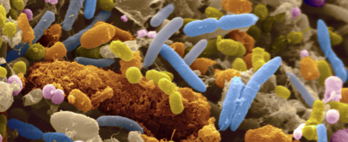Nyheter och resultat med EM
Ute i världen görs ständigt nya upptäckter kring tillämpningen av EM. Här samlar vi efterhand forskningslänkar, publicerade artiklar och exempel på hur EM används i olika miljöer.
2015 > 01
Den här artikeln i Huffington Post (4/1 2015) berättar om forskningsresultat kring hur bakteriefloran i magen är nära sammankopplad med mental hälsa. Studiens resultat visar hur bra bakterier kan hjälpa till att motverka ångest och depression. Vid obalans i magens bakterieflora bildas inflammatoriska tillstånd som påverkar såväl vår psykiska som fysiska hälsa.
In recent years, neuroscientists have become increasingly interested in the idea that there may be a powerful link between the human brain and gut bacteria. And while a growing body of research has provided evidence of the brain-gut connection, most of these studies so far have been conducted on animals.
Now, promising new research from neurobiologists at Oxford University offers some preliminary evidence of a connection between gut bacteria and mental health in humans. The researchers found that supplements designed to boost healthy bacteria in the gastrointestinal tract ("prebiotics") may have an anti-anxiety effect insofar as they alter the way that people process emotional information.
While probiotics consist of strains of good bacteria, prebiotics are carbohydrates that act as nourishment for those bacteria. With more evidence that gut bacteria may exert some influence on brain function and mental health, probiotics and prebiotics are being studied for the potential alleviation of anxiety and depression symptoms.
"Prebiotics are dietary fibers (short chains of sugar molecules) that good bacteria break down, and use to multiply," the study's lead author, Oxford neurobiologist Dr. Philip Burnet, told The Huffington Post. "Prebiotics are 'food' for good bacteria already present in the gut. Taking prebiotics therefore increases the numbers of all species of good bacteria in the gut, which will theoretically have greater beneficial effects than [introducing] a single species."
To test the efficacy of prebiotics in reducing anxiety, the researchers asked 45 healthy adults between the ages of 18 and 45 to take either a prebiotic or a placebo every day for three weeks. After the three weeks had passed, the researchers completed several computer tests assessing how they processed emotional information, such as positive and negatively-charged words.
The results of one of the tests revealed that subjects who had taken the prebiotic paid less attention to negative information and more attention to positive information, compared to the placebo group, suggesting that the prebiotic group had less anxiety when confronted with negative stimuli. This effect is similar to that which has been observed among individuals who have taken antidepressants or anti-anxiety medication.
The researchers also found that the subjects who took the prebiotics had lower levels of cortisol -- a stress hormone which has been linked with anxiety and depression -- in their saliva when they woke up in the morning.
While previous research has documented that altering gut bacteria has a similarly anxiety-reducing effect in mice, the new study is one of the first to examine this phenomenon in humans. As of now, research on humans is in its early stages. A study conducted last year at UCLA found that women who consumed probiotics through regularly eating yogurt exhibited altered brain function in both a resting state and when performing an emotion-recognition task.
"Time and time again, we hear from patients that they never felt depressed or anxious until they started experiencing problems with their gut," Dr. Kirsten Tillisch, the study's lead author, said in a statement. "Our study shows that the gut–brain connection is a two-way street."
So are we moving towards a future in which mental illness may be able to be treated (or at least managed) using targeted probiotic cocktails? Burnet says it's possible, although they're unlikely to replace conventional treatment.
"I think pre/probiotics will only be used as 'adjuncts' to conventional treatments, and never as mono-therapies," Burnet tells HuffPost. "It is likely that these compounds will help to manage mental illness... they may also be used when there are metabolic and/or nutritional complications in mental illness, which may be caused by long-term use of current drugs."
The findings were published in the journal Psychopharmacology.
http://www.huffingtonpost.com/2015/01/04/gut-bacteria-mental-healt_n_6391014.html
SAMMANFATTNING:
Studien gjordes för att undersöka effekten av gödsel fermenterad med hjälp av EM enligt Bokashi-metoden, och hur detta påverkar avkastning och näringssammansättning vid odling av ärtor (av sorten Vigna unguiculata L.). I studien användes tre olika typer av gödsel i kombination med EM: från kor, getter samt höns. Resultaten jämfördes med både icke-gödning av växterna samt konventionell gödslingsmetod och visade att gödsel som behandlats med EM-Bokashi och använts som gödningsmedel för ärtorna avsevärt ökade både storleken på plantorna och antalet löv, fler ärtskidor per planta, maximalt med antal ärtor per ärtskida och avsevärt högre kvalitet på ärtornas näringsinnehåll jämfört med både kemiska gödselmetoder och konventionella.
Vi som använder Bokashi i trädgården och även har tillgång till gödsel kanske borde testa detta?
För att läsa hela rapporten, se länken nedan:
http://banglajol.info/index.php/BJSIR/article/view/15411/10917





